 Other than the collapse of peace talks, this year’s biggest Mideast story was understood in shorthand.
Other than the collapse of peace talks, this year’s biggest Mideast story was understood in shorthand.
The Flotilla.
Basing its international legitimacy on unfounded claims of a humanitarian crisis, the Free Gaza Movement organized a number of attempts to break the Israeli-Egyptian blockade of Gaza by sea.
In the past, Israel had allowed individual small ships to reach Gaza. Before the Mavi Marmara, Lauren Booth — who “won” HonestReporting’s 2008 award — was the name most associated with the expeditions.
But the size of the convoys and the number of activists trying to reach Gaza became more than an annoying PR stunt that Israel could afford to play along with. The primary risks: allowing Hamas a corridor to smuggle weapons, and permitting terrorists threatening Israel to enter the Strip, all in the guise of humanitarian aid.
The Free Gaza flotilla of May played the media game remarkably well. Advance work on social media, a passenger list including a considerable number of journalists and flotillistas, and lots of digital equipment, all combined to get their stories online. In fact, they went a little overboard: footage captured by the IDF included “peace activists” declaring, “I want to be a shahid,” “We can die as martyrs,” and scenes of rioters preparing metal rods to attack soldiers.
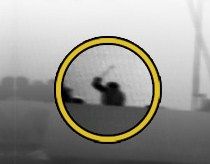 But the Israeli army demonstrated its own media savvy; the army filmed the raid and posted the video online. The result? IDF footage of its forces coming under violent attack went viral on YouTube, countering claims that the naval intercept was unnecessarily aggressive. One grainy still from the video of soldier being beaten by rioters became the event’s most iconic image.
But the Israeli army demonstrated its own media savvy; the army filmed the raid and posted the video online. The result? IDF footage of its forces coming under violent attack went viral on YouTube, countering claims that the naval intercept was unnecessarily aggressive. One grainy still from the video of soldier being beaten by rioters became the event’s most iconic image.
Readers pointed to an eclectic array of other issues HonestReporting tracked, most notably the status of eastern Jerusalem neighborhoods, allegations of Israeli organ-harvesting in Haiti, double standards in Big Media’s coverage of Palestinian and Afghan civilian deaths, and Hamas detaining British journalist Paul Martin for one month. Other noteworthy dishonorable mentions included:
-
Norwegian journalist Sidsel Wold haranguing Dr. Manfred Gerstenfeld during an interview, compelling the Israeli professor to fisk his own interview.
-
“Comment,” George Galloway’s talk show, censured by the UK’s independent media regulator, Ofcom. Galloway was found to repeatedly use viewers’ alternative opinions as a vehicle to bash Israel, violating guidelines on editorial balance. The show airs on Iran’s government-controlled Press TV.
-
AP labeling Ali Sweiti, a fugitive killed in an arrest raid, as an “activist.” (Here’s his record of activism.)
-
Egypt’s government-owned paper, Al-Ahram, caught digitally altering a photo of the White House summit. Incredulously, chief editor Omar Saraya claimed the photo was an illustration.
-
After Carleton University student Nick Bergamini and his Israeli roommate were were nearly lynched in an anti-Semitic attack in Ottawa, a CBC reporter gallingly asked Bergamini if he had enemies who might be quoted to give balance to the story. The CBC report aired without quoting “the other camp.”
On with the awards.
Poison Pen Award: Jeff Danziger
On 25 May, Palestinian terrorists in Gaza blew up a booby-trapped donkey cart close to the border with Israel, killing the animal, but causing no human casualties. In a separate attack the same day, Palestinian mortars landed near Ashkelon prompted a retaliatory Israeli air strike on Gaza tunnels.
And what was Jeff Danziger’s take?
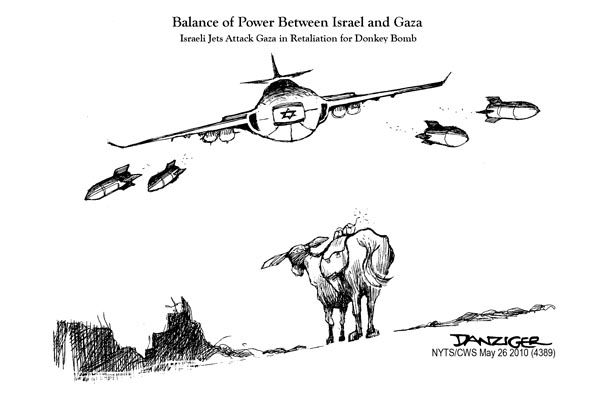
Least Reliable Source: Muawiya Hassanein, Gaza Health Ministry
In March, Maan News reported the death of a Palestinian boy based on information from Gaza medics:
Muawiya Hassanein, director of ambulance and emergency services in Gaza, said Muhammad Zen Ismail Al-Farmawi, 15, was shot dead near the southeasterly border by Israeli forces, while local sources who wished to remain anonymous said the death may have been an internal matter.
Hassanein said ambulances had been unable to retrieve the body because of ongoing clashes in the area, while an Israeli military spokesman said he had no knowledge of the incident.
But Farmawi very much alive. Egyptian soldiers caught the boy in a smuggling tunnel, then tortured Farmawi and his friends. Maan News explained the errors:
Muawiya Hassanein, Health Ministry director of ambulance and emergency services in Gaza, told Ma’an that after “huge efforts and contacts” to return the boy’s body, officials found him among those who were detained. He was assumed to have died in the clashes Tuesday after a Palestinian ambulance crew was refused permission to access to the area following reports of deadly fire, Hassanein explained at the time.
In what would turn out to be a second erroneous explanation that day, local residents also told Ma’an at the time that while the boy was indeed killed, the Israeli military was not involved. The purported death was an “internal matter,” locals said, insisting on anonymity.
News services like the NY Times picking up on the original reports also followed up. But questions remain. Why should Gaza medical sources be free of scrutiny — especially since they work under Hamas auspices? And how many other casualties has Israel erroneously been blamed for?
Most Disproportionate Photography: Reuters
IDF border maintenance is routine work that never attracted the slightest media interest — until the IDF decided to remove a tree on the Israeli side of the border in August. The Lebanese army claimed the IDF encroached on its territory, opened fire, leading to a deadly skirmish. (The UN confirmed later that the tree in question was on the Israeli side of the border.)
Coverage of the flare up was suspicious. There were too many images, too many photographers, all with unthinkable access to the front lines of the Lebanese side of the clash zone, for a “spontaneous” border eruption.
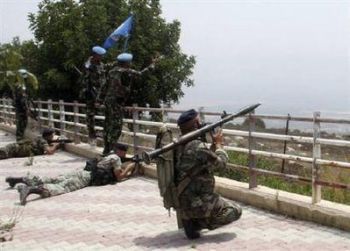
Lebanese soldiers take up position as U.N peacekeepers (in blue berets) gesture towards Israeli soldiers at the Lebanese-Israeli border in Adaisseh village, southern Lebanon August 3, 2010. REUTERS/ STR
Photographers from other news services were on hand too, but HonestReporting’s case study of Reuters photos raised the most troubling questions: How were five photographers encouraged to cover routine IDF maintenance work? How did they get such unrestricted real-time access to the combat zone? And why did Reuters take the unusual step of attributing one-quarter of the photos to unidentified stringers?
Readers had a separate bone to pick with Reuters over photos taken aboard the Mavi Marmara. When the wire service finished cropping the photos, knives wielded by “peace activists” simply vanished from widely published images.
Most Peerless Medical Review: The Lancet
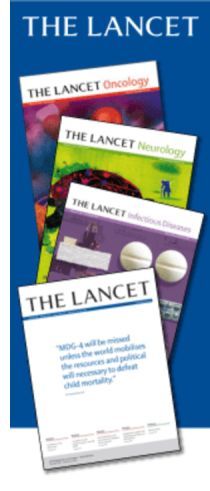 On July 2, The Lancet published what it billed as “the best peer-reviewed abstracts” from a meeting of the 2nd Lancet-Palestinian Health Alliance Conference.
On July 2, The Lancet published what it billed as “the best peer-reviewed abstracts” from a meeting of the 2nd Lancet-Palestinian Health Alliance Conference.
HonestReporting’s research into the contributors of this multi-article series revealed a shocking who’s who of the anti-Israel boycott-divestment-sanctions movement (BDS for short).
One article claimed that hundreds of Jewish settlers, escorted by Israeli police, stormed the Al-Aqsa Mosque on the day of the conference. Another article claimed without verification that the IDF shelled ambulances during the Gaza war. And this article blamed Israel for all the deficiencies of Palestinian health care in general.
One particular criticism of The Lancet, however, came from CBC ombudsman Kirk LaPointe. After the CBC picked up on the Palestinian malnutrition issues discussed in The Lancet, LaPointe, in an email with one HonestReporting reader, presciently noted:
In this case, I believe the public would have benefited at the outset from the inclusion of wider data to suggest how malnutrition among schoolchildren in the territories compares with data elsewhere. In an era of immense available information, the media have a responsibility to employ context to help the public understand a bigger picture. I would suggest a clarification be included in the body of the story to help readers understand how the territories compare with other countries and regions.
The question might arise: If this information had been taken into account in the first instance, would the story at all have been covered?
What happened to the scrutiny of peer review setting a high bar on what gets published in medical journals like The Lancet?
Media Manipulator of the Year: Dahi Khalfan
 Dubai’s top cop, Lt. Gen. Dahi Khalfan kept the Mahmoud Mabhouh assassination in the news, with countless press conferences featuring security footage, an ever-growing list of suspects, and blame for the Mossad.
Dubai’s top cop, Lt. Gen. Dahi Khalfan kept the Mahmoud Mabhouh assassination in the news, with countless press conferences featuring security footage, an ever-growing list of suspects, and blame for the Mossad.
But Khalfan never produced a proverbial smoking gun, and reporters like CNN‘s Paula Hancocks saw through the media circus:
Every day, without fail, the newspapers in the United Arab Emirates reserve part of the front page for an update, an opinion – even the tiniest hint of fresh information.
This is likely the intention of Lt. Gen. Dahi Khalfan. By releasing a tidbit here and there, the story stays alive and the international spotlight stays on Israel’s intelligence agency Mossad, which Khalfan says he is 100 percent sure is behind the hit.
One result of Khalfan’s showboating: Whether or not Israel killed Mabhouh, the Mossad’s cool.
Worst Obituary: Octavia Nasr
Octavia Nasr’s 20-year career came to a crashing end over a 99-character post on her CNN-branded Twitter account.
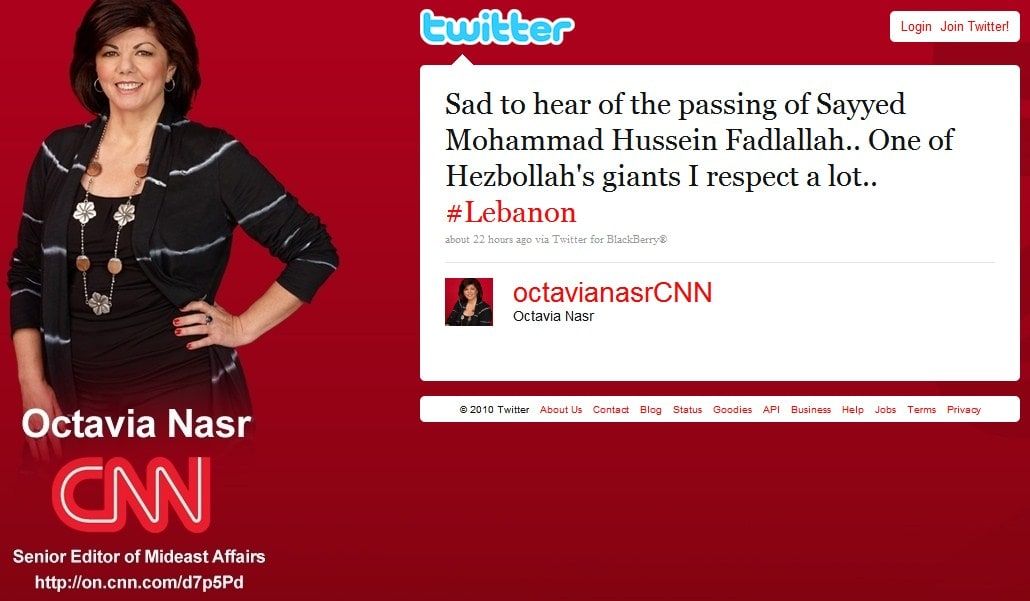
What exactly did Nasr “respect” about Fadlallah, one of Hezbollah’s founders? His approval of the Hezbollah manifesto, which describes “the necessity for the destruction of Israel?” Fadlallah’s ties to the 1979 seizure of the US embassy in Tehran, the 1983 truck bombing of the US Marines’ Beirut barracks, and support for the 2008 Mercaz HaRav Kook massacre? A deathbed fatwa authorizing suicide attacks?
Nasr’s more nuanced 4,371 character-long apology wasn’t enough for the network brass. CNN fired her after HonestReporting publicized the tweet.
Most Ironic Unintended Consequence: Electronic Intifada
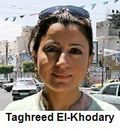 Electronic Intifada made waves when it sought to have NY Times’ Jerusalem bureau chief Ethan Bronner re-assigned. Why? Because Bronner’s son serves in the IDF, which EI claimed created a conflict of interest. Public editor Clark Hoyt concurred with EI, but when executive editor Bill Keller opposed any reassignment, everyone thought the matter was closed.
Electronic Intifada made waves when it sought to have NY Times’ Jerusalem bureau chief Ethan Bronner re-assigned. Why? Because Bronner’s son serves in the IDF, which EI claimed created a conflict of interest. Public editor Clark Hoyt concurred with EI, but when executive editor Bill Keller opposed any reassignment, everyone thought the matter was closed.
But the controversy forced out a different NY Times reporter. Taghreed El-Khodary explained to The Palestine Center why the sudden publicity surrounding Bronner’s son forced her to not only resign her job, but to leave Gaza too:
“I don’t want to risk losing my sources that I have been establishing for many, many years. It’s a very sensitive issue, as you all know, not only that, but it’s also risky and you have many small groups who would like revenge and I can be a great person to get a hold of.”
At the end of 2010, Bronner remains as bureau chief; Fares Akram now covers Gaza for the NYT, while Khodary is a visiting scholar in the Middle East program at the Carnegie Endowment. To HonestReporting’s knowledge Electronic Intifada never raised any issues concerning Khodary’s reporting, and Akram hasn’t indicated that covering Gaza for Bronner’s Zionist rag has harmed his own career.
As far as conflicts of interest go, ethical editors should be more concerned about their reporters who have affairs with, live with, and even marry Palestinian activists. Peter Jennings’ well-known dalliance with Hanan Ashrawi was just the tip of the iceberg.
Most Overdue Resignation: Helen Thomas
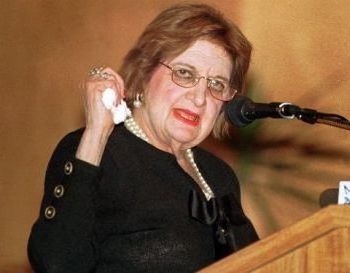 2010 will be remembered for the embarrassing, if not overdue, resignation of veteran White House correspondent Helen Thomas.
2010 will be remembered for the embarrassing, if not overdue, resignation of veteran White House correspondent Helen Thomas.
Thomas, who worked the West Wing for 57 years, told Rabbi David Nesenoff on camera that “Israel should get the hell out of Palestine,” and the Jews should go back to Poland and Germany.
As the video went viral, Thomas apologized and announced her retirement. But she later proved her apology worthless:
The Free Press asked her about her comments, which critics have said were anti-Israel.
“I paid the price for that,” said Thomas, a longtime White House correspondent. “But it was worth it, to speak the truth.”
The resignation was overdue. Politico pointed out that Thomas was the only columnist with a regular seat in a briefing room full of reporters, and very few papers published her columns anyway. Thomas’s views on Israel were well known to the rest of her White House colleagues. As one reporter told The Hill:
“But I don’t think anyone is surprised at the anti-Israeli remarks. She has never made any secret of her animus toward Israel.”
Photography Tip of the Year: The Guardian
The Guardian offered a photo tip along with this image:
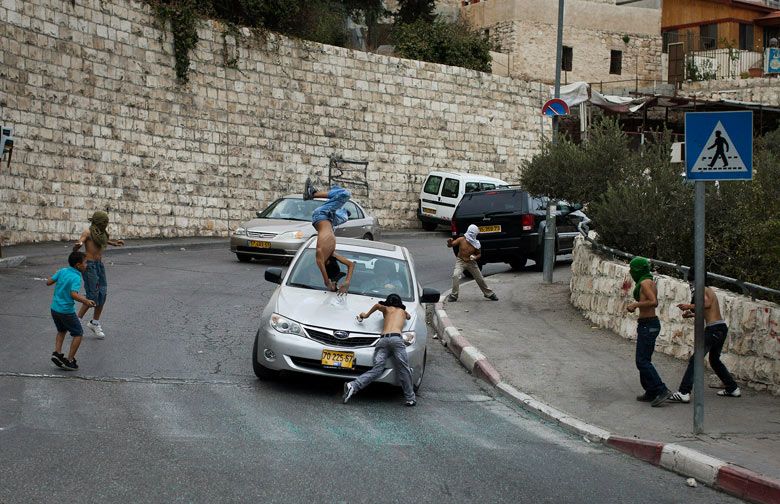
The photographer, Ilia Yefimovich, is in the right place at the right time and captures this dramatic scene using a large depth of field and fast shutter speed.
Actually, when David Be’eri’s car came around the bend, AP, Al Jazeera and EPA camermen (among others) just happened to be “in the right place at the right time” too. Photographers and stone-throwing kids fed off each other’s presence, giving new meaning to ambush journalism.
Most Undeserving of Honor: Paul McGeough
 Paul McGeough, the Sydney Morning Herald correspondent who sailed with the Gaza flotilla, received an ill-advised Walkley Award, Australia’s version of a Pulitzer prize, for his coverage of the Israeli raid on the Mavi Marmara.
Paul McGeough, the Sydney Morning Herald correspondent who sailed with the Gaza flotilla, received an ill-advised Walkley Award, Australia’s version of a Pulitzer prize, for his coverage of the Israeli raid on the Mavi Marmara.
McGeough’s first-hand coverage failed to shed any light on the convoy’s radical Islamic organizers, the IHH, information which was available before he made his travel plans. Nor did he report that the IHH specifically recruited individuals to attack Israeli soldiers, or that the IDF found bullet-proof vests, night vision equipment and rifle scopes, saws, knives, gas masks and slingshots. Moreover, McGeough’s language indicated an axe to grind with Israel: particularly the headline’s use of the word “terror,” and describing the soldiers as “hunting like hyenas.”
Months later, McGeough gave a speech revealing how the convoy’s primary goal was to provoke Israel into a embarrassing situation, along with his role in helping shape a narrative:
In story-telling, words can be bullets. Sure, events happen and as Israelis are wont to say, facts are created on the ground. But the words chosen by participants and observers shape the narrative as it resonates in the region and around the world . . . .
One of the earliest stated objectives of the sending boats to Gaza came from Michael Shaik, the Australian activist who came up with the idea. As he explains it, he wanted to reveal the inherent violence of an Israeli occupation that all too often leaches from the conflict narrative because of foreign revulsion at the Palestinian resort to suicide and rocket attacks.
Hardly the words of a humanitarian mission’s detached observer.
Special Achievement in Swinging to Extremes: Jane Corbin, BBC Panorama
 In mid-January, BBC’s flagship documentary program, Panorama, visited eastern Jerusalem. Titled “A Walk in the Park“, an HonestReporting critique detailed why Jane Corbin’s dispatch was anything but.
In mid-January, BBC’s flagship documentary program, Panorama, visited eastern Jerusalem. Titled “A Walk in the Park“, an HonestReporting critique detailed why Jane Corbin’s dispatch was anything but.
In no short order, Corbin:
-
Laid out the BBC’s own opinion that anything Israel does in eastern Jerusalem is illegal.
-
Denied Jewish rights to the city, as if Judaism’s ties to Jerusalem only began in 1948.
-
Disingenuously reported that 30-40 homes would be demolished because City Hall had to use up its budget.
-
Whitewashed Palestinian building violations.
-
Omitted that one Palestinian family evicted from a Sheikh Jarrah building had failed to pay its rent.
-
Claimed archeological projects are controlled by “right wing groups.”
However, Corbin redeemed herself in August with a Panorama report about the Mavi Marmara. In a strange twist, “Death in the Med” led Palestinian supporters to denounce the BBC as pro-Israel.
Dishonest Reporter of the Year: Time Magazine
It was a close vote, but Time managed to edge the other ignoble contenders for a September cover story stating: “Why Israel Doesn’t Care About Peace”.
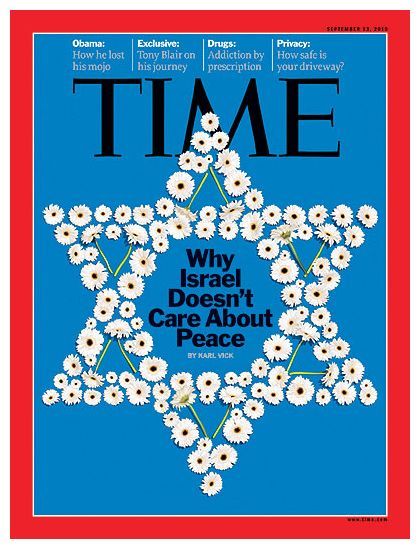
There were four primary reasons why the magazine “won.”
The Cover: Featured a Jewish star made of carefree daisies, with the headline, “Why Israel Doesn’t Care About Peace.” The headline assumed Israelis don’t care about peace; the only matter for discussion is why.
The significance of a magazine cover is about more than just attracting someone’s attention with a clever visual and snappy headline. The cover image and headline create a frame for the way readers relate to the article.
(More below on what a better nuanced headline might have legitimately said.)
In this case, Time’s cover could only prejudice anyone who so much as saw it on news stands around the world. The graphic artists involved in the design process and the editors who signed off on it are responsible.
As if the cover wasn’t offensive enough, it hit news stands around the world during the week of the Jewish New Year. Ouch.
The Article: Written by Karl Vick, relatively new to Israel, was off the mark. It absolutely needed colorful first-hand man-on-the-street qoutes from a representative sample of Israeli society to support any sweeping statements like the assumption Time’s cover made.
That would have required the observations of older Israeli-born sabras who have seen it all, young high-tech entrepreneurs with much to lose from conflict, new immigrants carving a niche, college students who may emerge as future leaders, Arab-Israelis of the northern triangle with a unique stake in peace, residents of Haifa’s mixed Jewish-Arab neighborhoods, Orthodox personalities who view Israel and the conflict through a religious lens, still struggling Gaza evacuees, and so on.
Instead, readers were presented with a trip to Ashdod, where Vick’s “cross section” of Israel consisted of two condo salesman who immigrated from Russia, an elderly lady and her waitress friend. All the the other comments came from the kind of people the media industry refers to as talking heads: newspaper columnists, political scientists, activists and politicians.
 The Images: Israelis lounging on the beach, a mother sitting on a park bench with a smiling baby in a stroller, an Israeli boy on a bicycle looking at a section of the security barrier being dismantled, accompanied by quote boxes making statements such as:
The Images: Israelis lounging on the beach, a mother sitting on a park bench with a smiling baby in a stroller, an Israeli boy on a bicycle looking at a section of the security barrier being dismantled, accompanied by quote boxes making statements such as:
“The Palestinian is no longer seen as a strategic threat anymore. A nuisance, yes.”
The Nuance: Too many readers also picked up on anti-Semitic undertones to ignore. Vick isn’t anti-Semitic, but his writing unintentionally reinforced an unfortunate stereotype, as Abe Foxman articulated:
The insidious subtext of Israeli Jews being obsessed with money echoes the age-old anti-Semitic falsehood that Jews care about money above any other interest, in this case achieving peace with the Palestinians.
Israelis want peace, but are skeptical of peace efforts, and are moving on with their lives. Had this been Time’s focus, it could have been a far more valuable piece of journalism. Maybe Time would have discovered insights about Israeli doves disillusioned by the Palestinian leadership or Israeli hawks pre-occupied with Iran. Perhaps Time might one day raise the issue,”Why Palestinians aren’t interested in peace.”
Nah.
Bottom line: A more honest cover headline would have said “Why Israel is skeptical of peace.” But that’s not a very sexy line to attract magazine purchases, is it?
Vick has what to answer for. But this award goes to Time as whole. Assembling a cover story is a team effort. Writers, photographers, graphic artists and a totem pole of editors left too many dirty fingerprints on the Sept. 13, 2010 issue’s timing, tone, and look. Time just didn’t care about Israel.
Stay tuned for an upcoming long-term study of Time magazine’s coverage of Israel.
* * *
We covered a lot of ground in 2010.
And with help from readers, we’ll continue to monitor and hold the media to account in 2011.

